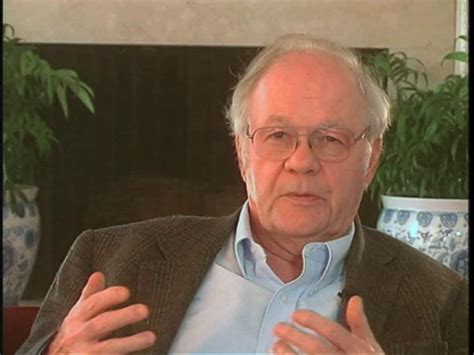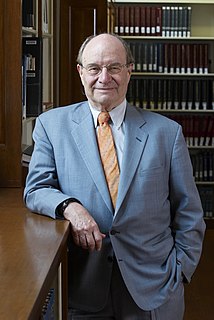Top 1200 Moral Failure Quotes & Sayings - Page 17
Explore popular Moral Failure quotes.
Last updated on December 19, 2024.
The desire for guidance, love, and support prompts men to form the social or moral conception of God. This is the God of Providence, who protects, disposes, rewards, and punishes; the God who, according to the limits of the believer's outlook, loves and cherishes the life of the tribe or of the human race, or even of life itself; the comforter in sorrow and unsatisfied longing; he who preserves the souls of the dead. This is the social or moral conception of God.
Success is created through the performance of a few small daily disciplines that stack up over time to produce achievements far beyond anything you could of ever planned for. Failure, on the other hand, is just as easy to slip into. Failure's is nothing more than the inevitable outcome of a few small acts of daily neglect performed consistently over time so that they take you past the point of no return.
Oh and I thought, as i was dressing, how interesting it would be to describe the approach of age, and the gradual coming of death. As people describe love. To note every symptom of failure: but why failure? To treat age as an experience that is different from the others; and to detect every one of the gradual stages towards death which is a tremendous experience, an not as unconscious, at least in its approaches, as death is.
Market forces have no intrinsically moral direction, which is why, before he wrote The Wealth of Nations, Adam Smith wrote The Theory of Moral Sentiments. Ethics should precede economics. But it doesn't have to. . . . We know this because we've seen the results of capitalism without conscience: the pollution of the air we breathe, the water we drink, and the food we eat; the endangerment of workers; and the sale of dangerous products - from cars to toys to drugs. All in pursuit of ever-greater profits.
The reason I love travel is not just because it transports you in every sense, but because it confronts you with emotional and moral challenges that you would never have to confront at home. So I like going out in search of moral and emotional adventure which throws me back upon myself and forces me to reconsider my assumptions and the things I took for granted. It sends me back a different person.
Recreation in the open is of the finest grade. The moral benefits are all positive. The individual with any soul cannot live long in the presence of towering mountains or sweeping plains without getting a little of the high moral standard of Nature infused into his being ... with eyes opened, the great story of the Earth's forming, the history of a tree, the life of a flower or the activities of some small animal will all unfold themselves to the recreationist.
Surprisingly, it's forgiveness, not guilt, that increases accountability. Researchers have found that taking a self-compassionate point of view on a personal failure makes people more likely to take personal responsibility for the failure than when they take a self-critical point of view. They also are more willing to receive feedback and advice from others, and more likely to learn from the experience.
The time has also come to recognize the painful truth that traditional Judeo-Christian moral values of pain and pleasure in human relationships have contributed substantially to child abuse and to the prevalence of physical violence in Western civilization.... The religious system upon which our culture is based holds that pain, suffering and deprivation are moral and necessary to save one's soul and make one a 'good person.' The crucifixion and scourging of Christ are examples.
Really great moral teachers never do introduce new moralities: it is quacks and cranks who do that.... The real job of every moral teacher is to keep on bringing us back, time after time, to the old simple principles which we are all so anxious not to see; like bringing a horse back and back to the fence it has refused to jump or bringing a child back and back to the bit in its lesson that it wants to shirk.
There is a moral virtue, a moral fidelity, ability and honesty, which other men, besides church members, are, by good nature and education, by good laws and good examples nourished and trained up in; so that civil places and trust and credit need not be monopolized into the hands of church members (who sometimes are not fitted for public office), while all others are deprived and despoiled of their natural and civil rights and liberties.
I do believe any hero is a person that can be knocked down. A failure isn't a person who gets knocked down; a failure is a person who stays down, and to me, the great heroes take the beating, get knocked down and stand back up again. Perseus is defined as one of the great heroes in literature, so you gotta take that on board.
I am afraid that those comments go back to the late 80's. At that time I was a skeptic - the argument based on Koch's postulates to try to distinguish between cause and association. Today I would regard the success of the many antiviral agents which lower the virus titers (to be expected) and also resolve the failure of the immune system (only expected if the virus is the cause of the failure) as a reasonable proof of the causation argument .
Their usual mistaken premise is that they affirm some consensus among people, at least among tame peoples, concerning certain moral principles, and then conclude that these principles must be unconditionally binding also for you and me-or conversely, they see that among different peoples moral valuations are necessarily different and infer from this that no morality is binding-both of which are equally childish.
Consumerism is, quite precisely, the consuming of life by the things consumed. It is living in a manner that is measured by having rather than being... and consumerism is hardly the sin of the rich. The poor, driven by discontent and envy, may be as consumed by what they do not have as the rich are consumed by what they do have. The question is not, certainly not most importantly, a question about economics. It is first and foremost a cultural and moral problem requiring a cultural and moral remedy.
All human beings are moral beings. So, certainly there are alliances. We are in the countries, that are secular states, and we obey its laws. I think we must recognize that common moral base. But in alliances we must always be careful just of what level the alliance is perceived. I will go and lecture to an atheist society, for example, but I will not lecture for them, because I am not an atheist. You see the difference.
While I think in principle people should not have irrational beliefs, I should say that as a matter of fact, it is people who hold what I regard as completely irrational beliefs who are among the most effective moral actors in the world, in many respects. They're among the worst, but also among the best, even though the moral beliefs are ostensibly the same.
She felt a stealing sense of fatigue as she walked; the sparkle had died out of her, and the taste of life was stale on her lips. She hardly knew what she had been seeking, or why the failure to find it had so blotted the light from her sky: she was only aware of a vague sense of failure, of an inner isolation deeper than the loneliness about her.
The moral justification of capitalism does not lie in the altruist claim that it represents the best way to achieve 'the common good.' It is true that capitalism does -- if that catch-phrase has any meaning -- but this is merely a secondary consequence. The moral justification for capitalism lies in the fact that it is the only system consonant with man's rational nature, that it protects man's survival qua man, and that its ruling principle is: justice
Remember that failure is part of the process of successful running. Performance is a roller coaster; to think otherwise is irrational and will cause you much stress and discouragement. Lighten up on yourself. Ups and downs can be expected. The performance of most serious runners fluctuates by the week. You win some, you lose some; some days you're hot, some days you're not. Don't fight with yourself when failure, the teacher, pays an unexpected visit. Open up to learning from it.
How does something immoral, when done privately, become moral when it is done collectively? Furthermore, does legality establish morality? Slavery was legal; apartheid is legal; Stalinist, Nazi, and Maoist purges were legal. Clearly, the fact of legality does not justify these crimes. Legality, alone, cannot be the talisman of moral people.
Choice! The key is choice. You have options. You need not spend your life wallowing in failure, ignorance, grief, poverty, shame, and self-pity. But hold on! If this is true then why have so many among us apparently elected to live in this manner? The answer is obvious. Those who live in unhappy failure have never exercised their options for a better way of life because they have never been aware that had any choices
Man, no doubt, owes many other moral duties to his fellow men; such as to feed the hungry, clothe the naked, shelter the homeless, care for the sick, protect the defenseless, assist the weak, and enlighten the ignorant. But these are simply moral duties, of which each man must be his own judge, in each particular case, as to whether, and how, and how far, he can, or will perform them.
It is significant that the socialist mentality is usually also an atheistic mentality, where atheism is understood not so much as the disbelief in God as the hatred of God˜an attitude as precarious logically as it has been destructive in practice. There is an important sense in which religion as traditionally understood reconciles humanity to imperfection and to failure. Since the socialist sets out to abolish failure, traditional religion is worse than _de trop_: it is an impediment to perfection.
That's one thing about Dave Filoni. He doesn't call me up unless there's something to think about or there's something that we have to work out on a philosophical or moral or a mythological riddle that we need to solve. Some sort of moral conundrum that we need to place our feet on one side or the other. It's fun when we can ambiguously put those feet into the sand and let the fans discover for itself what it all means.
Successful or not, acts of physical courage always bring honor. It is the smaller forms of valor - standing up for principle at the risk of social disapproval, economic loss or injury to career - that require the greatest moral will power. Since there is usually little upside to winning and a significant and often lasting downside to losing, moral courage often requires as much character as physical bravery.
We can't literally talk with everybody else on the planet or even with representatives of every group. But we can be in favor of the respectful exchange of ideas in ways that don't presuppose that all the right answers are on our own side. Still, we should all have moral bottom lines. Once genocide or torture begins the priority shifts from understanding to stopping it. One hope I have for the global conversation as instantiated in human rights treaties is that we are slowly coming to consensus on certain moral baselines.
Lastly, our ancestors established their system of government on morality and religious sentiment. Moral habits, they believed, cannot safely be trusted on any other foundation than religious principle, nor any government be secure which is not supported by moral habits.... Whatever makes men good Christians, makes them good citizens.
And so was Luria, whose words now came back to me: ‘A man does not consist of memory alone. He has feeling, will, sensibility, moral being ... It is here ... you may touch him, and see a profound change.’ Memory, mental activity, mind alone, could not hold him; but moral attention and action could hold him completely.
Indiscriminate tolerance and indiscriminate condemnation are not two opposites: they are two variants of the same evasion. To declare that “everybody is white” or “everybody is black” or “everybody is neither white nor black, but gray,” is not a moral judgment, but an escape from the responsibility of moral judgment.
The insistence on truthfulness does not disturb the freedom of the individual. The social obligation implied in Satyagraha turns the freedom of the individual into moral freedom. An atheist is free to say or to do what he likes, provided he does what he says and says what he does. So, in the context of social relations, the freedom of the individual is moral freedom.
For God to be kept out of the classroom or out of America's public debate by nervous school administrators or overcautious politicians serves no one's interests. That restriction prevents people from drawing on this country's rich and diverse religious heritage for guidance, and it degrades the nation's moral discourse by placing a whole realm of theological reasoning out of bounds. The price of that sort of quarantine, at a time of moral dislocation, is - and has been - far too high.
The very idea of freedom presupposes some objective moral law which overarches rulers and ruled alike. Subjectivism about moral values is eternally incompatible with democracy. We and our rulers are of one kind only so long as we are subject to one law. But if there is no Law of Nature, the ethos of any society is the creation of its rulers, educators and conditioners; and every creator stands above and outside his own creation.
I think I would rather live on the verge of falling and let my security be in the all-sufficiency of the grace of God than to live in some pietistic illusion of moral excellence. Not that I don't want to be morally excellent but my faith isn't in the idea that I'm more moral than anybody else. My faith is in the idea that God and His love are greater than whatever sins any of us commit.
Many politicians and pundits claim that the credit crunch and high mortgage foreclosure rate is an example of market failure and want government to step in to bail out creditors and borrowers at the expense of taxpayers who prudently managed their affairs. These financial problems are not market failures but government failure. ... The credit crunch and foreclosure problems are failures of government policy.
Maybe the growth of "God" signifies the existence of God. That is: if history naturally pushes people toward moral improvement, toward moral growth, and their God, as they conceive their God, grows accordingly, becoming morally richer, then maybe this growth is evidence of some higher purpose, and maybe - conceivably - the source of that purpose is worthy of the name divinity.
This Creative Mechanism within you is impersonal. It will work automatically and impersonally to achieve goals of success and happiness, or unhappiness and failure, depending upon the goals which you yourself set for it. Present it with success goals and it functions as a Success Mechanism. Present it with negative goals, and it operates just as impersonally, and just as faithfully as a Failure Mechanism.
[Prudence] is the virtue of that part of the intellect [the calculative] to which it belongs; and . . . our choice of actions will not be right without Prudence any more than without Moral Virtue, since, while Moral Virtue enables us to achieve the end, Prudence makes us adopt the right means to the end.
... For all our alarm, it is clear that the religious right is responding to a real hunger in our society... a deep-seated yearning for stable values... When conservative Christian groups talk of failures in our educational system, the erosion of our moral standards, and the waste of young lives, they are addressing real and legitimate concerns... Among secularists, the aversion toward discussion of moral values, let alone religion, can reach absurd extremes.
Since my moral system rests on my accepted version of the facts, he who denies my moral judgments or my version of the facts, is to me perverse, alien, dangerous. How shall I account for him? The opponent has always to be explained, and the last explanation that we ever look for is that he sees a different set of facts. Such an explanation we avoid, because it saps the very foundation of our own assurance that we have seen life steadily and seen it whole.
For nearly a century, the moral relativism of science has given faith-based religion--that great engine of ignorance and bigotry--a nearly uncontested claim to being the only universal framework for moral wisdom. As a result, the most powerful societies on early spend their time debating issues like gay marriage when they should be focused on problems like nuclear proliferation, genocide, energy security, climate change, poverty, and failing schools.
It seems perfectly clear that Economy, if it is to be a science at all, must be a mathematical science. There exists much prejudice against attempts to introduce the methods and language of mathematics into any branch of the moral sciences. Most persons appear to hold that the physical sciences form the proper sphere of mathematical method, and that the moral sciences demand some other method-I know not what.
My first fundamental premise of our faith is that God is real and so are eternal truths and values not provable by current scientific methods. These ideas are inevitably linked. Like other believers, we proclaim the existence of the ultimate lawgiver, God our Eternal Father, and the existence of moral absolutes. We reject the moral relativism that is becoming the unofficial creed of much of modern culture.
Destructive Failure: Reveals limitations and weakness, highlights your shortcomings and when not processed correctly, keeps you feeling inadequate and defective. Productive failure: Reveals limitations and weakness, highlights your erroneous thinking and when processed correctly, leads you to better options and keeps you dependent on the Lord.
The concept of absolute, hence (or whence) springs, in the moral field, the moral laws or norms, represent, in the field of knowledge, the principle of identity, which is the fundamental law of the thought; norms of logic springs from it, that govern the thought (or mind) in the field of science." ("Le concept de l'absolu, d'où découlent, dans le domaine moral, les lois ou normes morales, constitue, le principe d'identité, qui est la loi fondamentale de la pensée; il en découle les normes logiques qui régissent la pensée dans le domaine de la science.")
It is true (independently of our conceptualisation) that it is wrong to inflict pain on a sentient creature for no reason (she doesn't deserve it, I haven't promised to do it, it is not helpful to this creature or to anyone else if I do it, and so forth). But if this is a truth, existing independently of our conceptualisation, then at least one moral fact (this one) exists and moral realism is true. We have to accept this, I submit, unless we can find strong reasons to think otherwise.
The moral authority in the Western world is gone. And it is gone forever. It is gone, not because of the criminal record--everybody's record is criminal. It is gone because you cannot do one thing and pretend you're doing another! None of us, who are sitting around in some of the true limbo out-of-space, which we call "now," waiting to be saved, civilized, or discovered, have the moral authority to say anything.
I would say to anybody who thinks that all the problems in philosophy can be translated into empirically verifiable answers - whether it be a Lawrence Krauss thinking that physics is rendering philosophy obsolete or a Sam Harris thinking that neuroscience is rendering moral philosophy obsolete - that it takes an awful lot of philosophy - philosophy of science in the first case, moral philosophy in the second - even to demonstrate the relevance of these empirical sciences.
While some animals exhibit individual powers in higher perfection, man stands for their superior, not only in combining in his own body all the senses and faculties which they possess, but in being endowed with moral and intellectual powers which are denied to them, and which at once place him at the head of the living creation, and constitute him a moral, religious, intelligent, and responsible being.
Many years ago I was driven to the conclusion that the two major causes of most emotional problems among evangelical Christians are these: the failure to understand, receive, and live into God's unconditional grace and forgiveness; and the failure to give out that unconditional love, forgiveness, and grace to other peopleWe read, we hear, we believe a good theology of grace. But that's not the way we live. The good news of the Gospel of grace has not penetrated the level of our emotions.
Poetry interprets in two ways: it interprets by expressing, with magical felicity, the physiognomy and movements of the outward world; and it interprets by expressing, with inspired conviction, the ideas and laws of the inward world of man's moral and spiritual nature. In other words, poetry is interpretative both by having natural magic in it, and by having moral profundity.
At the center of the Christian faith is the affirmation that there is a God in the universe who is the ground and essence of all reality. A Being of infinite love and boundless power, God is the creator, sustainer, and conserver of values....In contrast to the ethical relativism of [totalitarianism], Christianity sets forth a system of absolute moral values and affirms that God has placed within the very structure of this universe certain moral principles that are fixed and immutable.
Willpower should be understood to be the strength of the mind, which makes it capable of meeting success or failure with equanimity. It is not synonymous with certain success. Why should one's attempts always be attended by success? Success breeds arrogance and man's spiritual progress is thus arrested. Failure, on the other hand, is beneficial, inasmuch as it opens his eyes to his limitations and prepares him to surrender himself. Self surrender is synonymous with eternal happiness.
The line between failure and success is so fine that we are often on the line and do not know it. How many a person has thrown up his or her hands at a time when a little more effort, a little more patience, would have achieved success. A little more persistence, a little more effort, and what seemed hopeless failure may turn to glorious success.
The American system demands success, and in order to succeed we must first believe that we can. Yet our society, with its intolerance of failure and poverty, traps millions of people in positions where any kind of success seems impossible to contemplate, and in which failure itself is a kind of passive rebellion against their own misery and the social system which created it in the first place. To succeed it is necessary to accept the world as it is and rise above it.
























































